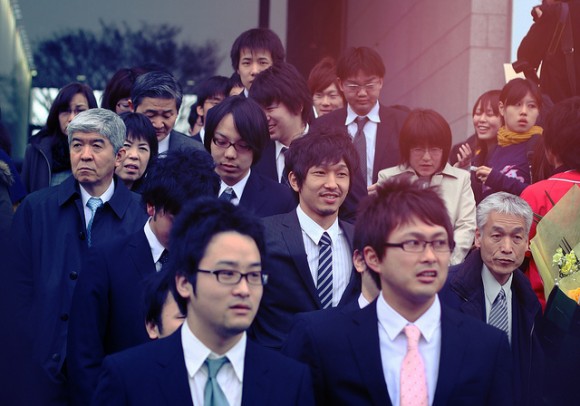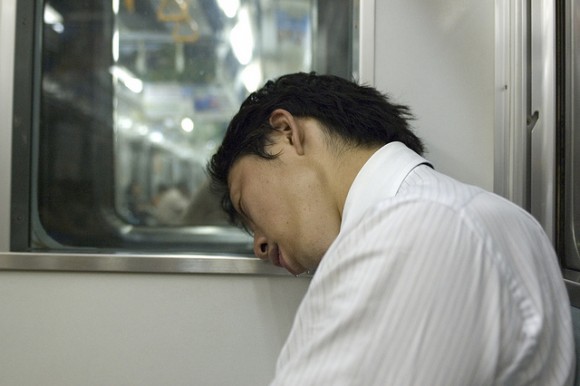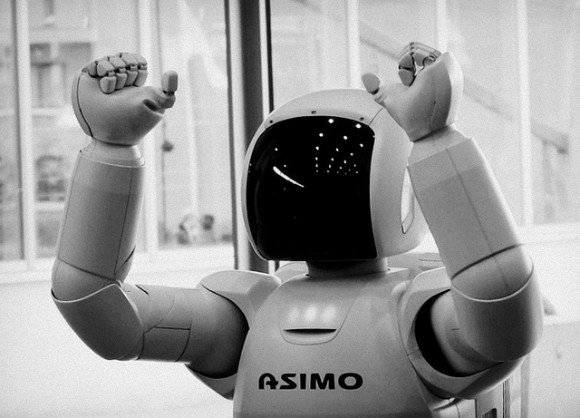
A study found that workers in Japan distrust their employers significantly more than workers in the US, UK, Canada and Australia do.
In the past, Japanese work culture revolved around one core belief: “lifetime employment”. Workers would join a company after graduation from university and remain with that company until their retirement. Often, a strong bond would form between the worker and his (rarely her) company, with customs such as company-wide trips, and “bring your family” events. Accordingly, workers in Japan used to have an awful lot of job security, and job-hopping simply wasn’t a thing.
Japan’s workers have less job security, but are still under pressure to put in the overtime and workplace after-hours socialising that has always been expected of them.
Now, however, the only people who are generally granted job security for life are civil servants, who work at city hall for their entire career and get shuffled around every couple of years in a process called jinji-idou (personnel transfers) which is designed to keep things fresh. Those who work for regular companies, however, have much less obligation to stick with their employer than they used to, and, in turn, that has led to companies showing significantly less care for their employees. One has only to consider the high incidence of contract workers and part-time workers, and the emergence of so-called “black companies” which flout labour laws and in some cases treat their employees so badly, it can even drive them to suicide.
A new survey conducted by Edelman PR polled Japanese workers to discover just how loyal they feel towards their employers in this economic climate. The results are unsurprising — only 40 percent of those polled agreed with the statement: “I trust the company I work for”.
The results come as part of a larger poll in which the same question was posed to workers in 28 other countries; of that number, Japan ranked bottom in employer company trust. Mexico ranked highest with 89 percent agreeing to the statement. Other results included: United States (64 percent), United Kingdom (57 percent), Australia (54 percent), Canada (64 percent), Germany (62 percent), and France (48 percent). (Click here for the full breakdown.)
Surely it’s only a matter of time until we’re all replaced with robots, anyway?
Another statement, “I foresee improvement in the next five years for myself and my ability to provide for my family” , was met with only a 19 percent agreement rate amongst white-collar workers, dropping to 15 percent amongst blue-collar workers. The global average was 55 and 47 percent respectively for white- and blue-collar workers, indicating that Japanese workers are generally highly pessimistic about their futures in their current companies.
Source: Slideshare.net via NicoNicoNews
Feature Image: Flickr/Azlan DuPree



 More than half of young anime workers live with their parents or receive money from them【Survey】
More than half of young anime workers live with their parents or receive money from them【Survey】 Microsoft Japan’s experiment with 3-day weekend boosts worker productivity by 40 percent
Microsoft Japan’s experiment with 3-day weekend boosts worker productivity by 40 percent Study reveals staff shortage in Japanese firms, suggests a need to accept low-skilled foreigners
Study reveals staff shortage in Japanese firms, suggests a need to accept low-skilled foreigners Survey finds only six percent of Japanese workers motivated, seventh lowest in the world
Survey finds only six percent of Japanese workers motivated, seventh lowest in the world 60 percent of young, “irregular workers” in Japan want a do-over
60 percent of young, “irregular workers” in Japan want a do-over Japan has trams that say “sorry” while they ride around town…but why?
Japan has trams that say “sorry” while they ride around town…but why? Is Sapporio’s Snow Festival awesome enough to be worth visiting even if you hate the snow? [Pics]
Is Sapporio’s Snow Festival awesome enough to be worth visiting even if you hate the snow? [Pics] Starbucks Japan releases new sakura goods and drinkware for cherry blossom season 2026
Starbucks Japan releases new sakura goods and drinkware for cherry blossom season 2026 Japan’s bathhouse-themed bar replaces hot water with unlimited alcohol
Japan’s bathhouse-themed bar replaces hot water with unlimited alcohol Crazy-cheap Tokyo lunch: All-you-can-eat curry rice for 220 yen (US$1.40)!
Crazy-cheap Tokyo lunch: All-you-can-eat curry rice for 220 yen (US$1.40)! Starbucks Japan unveils new sakura Frappuccino for cherry blossom season 2026
Starbucks Japan unveils new sakura Frappuccino for cherry blossom season 2026 East Japan Railway abolishes skirts, ribbons in women’s uniforms to “eliminate gender difference”
East Japan Railway abolishes skirts, ribbons in women’s uniforms to “eliminate gender difference” Sakura Totoro is here to get spring started early with adorable pouches and plushies
Sakura Totoro is here to get spring started early with adorable pouches and plushies Japan’s permanent Pokémon theme park zone announces grand opening date, ticket sale start
Japan’s permanent Pokémon theme park zone announces grand opening date, ticket sale start Japan has omurice chocolate, and the weirdest thing isn’t how it tastes
Japan has omurice chocolate, and the weirdest thing isn’t how it tastes Japan’s newest Shinkansen has no seats…or passengers [Video]
Japan’s newest Shinkansen has no seats…or passengers [Video] Foreigners accounting for over 80 percent of off-course skiers needing rescue in Japan’s Hokkaido
Foreigners accounting for over 80 percent of off-course skiers needing rescue in Japan’s Hokkaido Super-salty pizza sends six kids to the hospital in Japan, linguistics blamed
Super-salty pizza sends six kids to the hospital in Japan, linguistics blamed Foreign tourists in Japan will get free Shinkansen tickets to promote regional tourism
Foreign tourists in Japan will get free Shinkansen tickets to promote regional tourism Take a trip to Japan’s Dododo Land, the most irritating place on Earth
Take a trip to Japan’s Dododo Land, the most irritating place on Earth Naruto and Converse team up for new line of shinobi sneakers[Photos]
Naruto and Converse team up for new line of shinobi sneakers[Photos] Now is the time to visit one of Tokyo’s best off-the-beaten-path plum blossom gardens
Now is the time to visit one of Tokyo’s best off-the-beaten-path plum blossom gardens Can you eat lunch in Tokyo for less than 500 yen?
Can you eat lunch in Tokyo for less than 500 yen? Japan releases first official sakura cherry blossom forecast for 2026
Japan releases first official sakura cherry blossom forecast for 2026 Archfiend Hello Kitty appears as Sanrio launches new team-up with Yu-Gi-Oh【Pics】
Archfiend Hello Kitty appears as Sanrio launches new team-up with Yu-Gi-Oh【Pics】 China’s don’t-go-to-Japan warning looks to be affecting tourist crowds on Miyajima
China’s don’t-go-to-Japan warning looks to be affecting tourist crowds on Miyajima Survey asks foreign tourists what bothered them in Japan, more than half gave same answer
Survey asks foreign tourists what bothered them in Japan, more than half gave same answer Japan’s human washing machines will go on sale to general public, demos to be held in Tokyo
Japan’s human washing machines will go on sale to general public, demos to be held in Tokyo Starbucks Japan releases new drinkware and goods for Valentine’s Day
Starbucks Japan releases new drinkware and goods for Valentine’s Day We deeply regret going into this tunnel on our walk in the mountains of Japan
We deeply regret going into this tunnel on our walk in the mountains of Japan Studio Ghibli releases Kodama forest spirits from Princess Mononoke to light up your home
Studio Ghibli releases Kodama forest spirits from Princess Mononoke to light up your home Major Japanese hotel chain says reservations via overseas booking sites may not be valid
Major Japanese hotel chain says reservations via overseas booking sites may not be valid Put sesame oil in your coffee? Japanese maker says it’s the best way to start your day【Taste test】
Put sesame oil in your coffee? Japanese maker says it’s the best way to start your day【Taste test】 No more using real katana for tourism activities, Japan’s National Police Agency says
No more using real katana for tourism activities, Japan’s National Police Agency says Japanese ladies list top five companies whose employees they’d most/least like to date
Japanese ladies list top five companies whose employees they’d most/least like to date Despite their hardworking image, are the Japanese really just as lazy as the rest of us?
Despite their hardworking image, are the Japanese really just as lazy as the rest of us? One in four surveyed Japanese workers admits to wanting to kill boss, Osaka quake helps show why
One in four surveyed Japanese workers admits to wanting to kill boss, Osaka quake helps show why Cashiers given chairs as Japanese companies reconsider if it’s OK for workers to sit during their shifts
Cashiers given chairs as Japanese companies reconsider if it’s OK for workers to sit during their shifts Live with parents or burn through your savings? Survey of young anime workers draws bleak picture
Live with parents or burn through your savings? Survey of young anime workers draws bleak picture Nearly half of young Japanese women say they “hate” the company they work for in survey
Nearly half of young Japanese women say they “hate” the company they work for in survey What’s the best way to close the gender gap in Japan? Japanese women weigh in
What’s the best way to close the gender gap in Japan? Japanese women weigh in Foreign workers respond to survey about changes they’d like to see in the Japanese workplace
Foreign workers respond to survey about changes they’d like to see in the Japanese workplace Japanese company trips – Workers “absolutely hate” them, so why do they still happen?
Japanese company trips – Workers “absolutely hate” them, so why do they still happen? More Japanese workers are ditching crisp business suits for casual and comfortable wear
More Japanese workers are ditching crisp business suits for casual and comfortable wear Young Japanese singles list the organizations they’d most like a potential date to work for
Young Japanese singles list the organizations they’d most like a potential date to work for Japanese politicians want workers across country to have option for three-day weekends every week
Japanese politicians want workers across country to have option for three-day weekends every week Japan’s “workstyle reforms” are actually making managers’ jobs a lot harder【Survey】
Japan’s “workstyle reforms” are actually making managers’ jobs a lot harder【Survey】 One of Japan’s largest financial companies offers four-day weekend plan for all employees
One of Japan’s largest financial companies offers four-day weekend plan for all employees English reactions to A Day in the Life of a Japanese Salaryman video sadden Japanese netizens
English reactions to A Day in the Life of a Japanese Salaryman video sadden Japanese netizens Majority of surveyed Japanese workers have dated a coworker, over 20 percent their boss or senpai
Majority of surveyed Japanese workers have dated a coworker, over 20 percent their boss or senpai